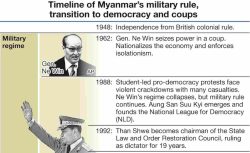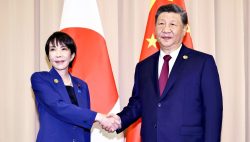Dissolution of Lower House: Strength of Ruling, Opposition Parties Is Being Tested / Present Prescriptions to Overcome National Crises
17:23 JST, October 10, 2024
Prime Minister Shigeru Ishiba has dissolved the House of Representatives. The government has decided to hold the lower house election with campaigning officially starting on Oct. 15 and voting and ballot counting taking place on Oct. 27.
Will voters entrust the management of government to the ruling parties again, with hopes for the newly inaugurated Ishiba Cabinet, or will they enable the opposition parties to make great strides and bring about a more fluid political situation? The opportunity to choose a new administration for the first time in three years has effectively begun.
One characteristic of this election is that it will be held immediately after the three major parties — the ruling Liberal Democratic Party, its coalition partner Komeito and the major opposition party, the Constitutional Democratic Party of Japan — have all changed their party leaders. The Japanese Communist Party also changed its leader in January. For each of the parties, their ability will be tested in the election.
Highly unusual short-term battle
Political parties must present the visions they will pursue for the nation and their prescriptions for overcoming the national crises. It is essential to provide voters with sufficient materials for making a decision.
The circumstances surrounding the dissolution of the lower house were highly unusual. The incoming prime minister announced the election schedule the day before he officially took office. The dissolution eight days after he took office and the voting and ballot counting 26 days later are the shortest time frames for both events under the current Constitution.
There is no doubt that the LDP considers it a good idea to seek the public’s judgment of the Ishiba Cabinet while expectations for it are high immediately after its inauguration.
However, it remains to be seen whether the election campaign will develop as the LDP hopes. Within the party, there is confusion and growing discord over whether to confer official LDP candidate endorsements on lawmakers who had failed to include political funds that they received in their political funds reports.
The LDP party leadership, including the prime minister, had been preparing to endorse as official party candidates, in principle, those lawmakers who had been punished by the party for such failures. However, the leadership changed the policy when it saw strong public criticism against it.
In the end, endorsements as official party candidates were withheld from 12 — lawmakers, some of whom belonged to the former Abe faction, and the chief of an LDP branch. In addition, regardless of whether they had been punished, it was decided that 34 lawmakers and others will not be allowed to run in the proportional representation segment at the same time as running in a single-seat constituency.
In the process, the leadership increased the number of lawmakers who are not endorsed as official party candidates from two to six, then from six to 12, an approach that lawmakers of the former Abe faction criticized, saying that it is too ad hoc a measure. It appears this will inevitably affect the party management after the election.
Growing intraparty discord
The LDP’s lack of definite vision in trying to get by on a case-by-case basis, without a firm policy on how to settle the issue of politics and money, has led to this confusion.
Also, one factor behind the confusion is that many middle-ranking and younger lawmakers of the current LDP were elected with a tailwind of high approval ratings for the party since the second Cabinet of former Prime Minister Shinzo Abe. These lawmakers, who won their seats by relying on voter sentiment trends, have a fragile electoral base.
At the same time, a similar trend can be seen in the current situation of the opposition parties. They are trying to expand their influence by relying on critical voters by simply blaming the LDP, while neglecting efforts to enhance the appeal of their own parties.
In the first Diet debates between party leaders in three months, CDPJ leader Yoshihiko Noda spent most of his 40-minute discussion time pursuing the issue of politics and money.
Noda repeatedly demanded of the prime minister that the LDP conduct its investigation once more, claiming that the LDP’s investigation was inadequate. He ended his part of the debate by stating that “change of power itself is the greatest political reform.”
It is certain that the issue of politics and money is important, but simply criticizing that the LDP’s investigation “was inadequate to get to the bottom of the matter” is not enough to find a way out. Even though the Tokyo District Public Prosecutors Office’s special investigation squad has thoroughly conducted a compulsory investigation, the issue has not been settled. Without new evidence to support its claims, there is a limit to its pursuit of the issue.
In addition, in their debates with Ishiba, Japan Innovation Party leader Nobuyuki Baba; JCP Chairperson Tomoko Tamura; and Yuichiro Tamaki, leader of the Democratic Party for the People, all focused on the scandal of LDP factions’ violations of the Political Funds Control Law.
Distrust in existing political parties has not been eliminated. Political reform is one of the major points of contention in the lower house election.
However, the challenges facing Japan should not be limited to this issue.
Are the opposition parties able to reflect the will of the people in ways that the LDP cannot? Unless they can come up with policies backed by financial resources, not just pork-barrel budget spending, they will not in any way be seen as parties capable of taking over the reins of the government.
Deepen policy debates
Domestic and international issues to be addressed are piling up.
The previous Cabinet of former Prime Minister Fumio Kishida decided to implement new measures to deal with the declining birth rate. But many point out that they are ineffective because they focus mainly on the provision of benefits, such as by expanding child allowances. Besides, how to secure financial resources for the measures has yet to be decided.
If the declining birth rate and shrinking population are not halted, the nation’s strength will decline. There also is an urgent need to give the social security system a sustainable framework. The ruling and opposition parties need to discuss effective measures for that purpose during the election campaign.
The international situation is drastically changing and Japan’s diplomatic power is being tested.
The deteriorating security environment is another issue that must be addressed most urgently. It is hoped that discussions will be deepened on related issues, including improving defense capabilities, strengthening the Japan-U.S. alliance and how to cooperate closely with like-minded countries.
(From The Yomiuri Shimbun, Oct. 10, 2024)
Top Articles in Editorial & Columns
-

Myanmar Will Continue Under Military Rule Even After Election, Ex-Ambassador Maruyama Says in Exclusive Interview
-

40 Million Foreign Visitors to Japan: Urgent Measures Should Be Implemented to Tackle Overtourism
-

Expansion of New NISA: Devise Ways to Build up Household Assets
-

China Criticizes Sanae Takaichi, but China Itself Is to Blame for Worsening Relations with Japan
-

Withdrawal from International Organizations: U.S. Makes High-handed Move that Undermines Multilateral Cooperation
JN ACCESS RANKING
-

Univ. in Japan, Tokyo-Based Startup to Develop Satellite for Disaster Prevention Measures, Bears
-

JAL, ANA Cancel Flights During 3-day Holiday Weekend due to Blizzard
-

China Confirmed to Be Operating Drilling Vessel Near Japan-China Median Line
-

China Eyes Rare Earth Foothold in Malaysia to Maintain Dominance, Counter Japan, U.S.
-

Japan Institute to Use Domestic Commercial Optical Lattice Clock to Set Japan Standard Time



















